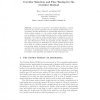Free Online Productivity Tools
i2Speak
i2Symbol
i2OCR
iTex2Img
iWeb2Print
iWeb2Shot
i2Type
iPdf2Split
iPdf2Merge
i2Bopomofo
i2Arabic
i2Style
i2Image
i2PDF
iLatex2Rtf
Sci2ools
132
Voted
LION
2009
Springer
2009
Springer
Corridor Selection and Fine Tuning for the Corridor Method
In this paper we present a novel hybrid algorithm, in which ideas from the genetic algorithm and the GRASP metaheuristic are cooperatively used and intertwined to dynamically adjust a key parameter of the corridor method, i.e., the corridor width, during the search process. In addition, a fine-tuning technique for the corridor method is then presented. The response surface methodology is employed in order to determine a good set of parameter values given a specific problem input size. The effectiveness of both the algorithm and the validation of the fine tuning technique are illustrated on a specific problem selected from the domain of container terminal logistics, known as the blocks relocation problem, where one wants to retrieve a set of blocks from a bay in a specified order, while minimizing the overall number of movements and relocations. Computational results on 160 benchmark instances attest the quality of the algorithm and validate the fine tuning process.
Related Content
| Added | 27 May 2010 |
| Updated | 27 May 2010 |
| Type | Conference |
| Year | 2009 |
| Where | LION |
| Authors | Marco Caserta, Stefan Voß |
Comments (0)

